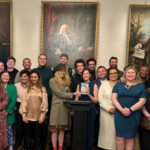Tips from the Open University
Students often share ideas and work collectively on a topic or task to help each other understand what is involved. This is called collaboration, or collaborative learning, and can be a very valuable process. Good collaborative learning linked to assessed work should stop at the level of general discussions, with each student writing up their answer individually, in their own time and in their own words. Good collaboration does not involve discussing the precise answers or giving an exact approach to solving a question that will form part of some assessed work.
Working too closely with other students is called collusion, and is a type of plagiarism. Collusion may involve:
> working with one or more individuals on the precise method or approach needed to answer a task or question (either telling others or asking others for this information)
> discussing how to solve an assessed task or question in such a way that the final answer is very obvious
> working through an assessed task or question and writing the answers together so that they are very similar in content, structure and style
> sharing the answer to an assessed task or question (either making this available to others or receiving/taking it from others) to see what needs to be included in the final answer or approach to a task.
In each of these examples, the final work presented for assessment is no longer that of the individual because it either includes undisclosed contributions from other individuals or has enabled others to enhance their answer in an unfair manner. As such, it now represents the understanding and application of the group and not the individual. Anyone who takes part in these or similar examples to gain an advantage in marks and in which their work becomes blurred with that of others has colluded. As such, they are at risk of losing marks or being awarded a zero grade for their assignment, because they have submitted plagiarised work as their own.
In an online discussion (e.g. within a course forum, a series of emails, or an instant messaging service such as Skype or MSN), every word presented is a part of the permanent written record, which is easy to review over and over again. It is also easy to cut and paste into your document, so very easy to plagiarise! It is important to write your own notes about what you have gleaned from an online discussion, rather than simply cutting and pasting. Then, when you come to write your assignment it will be based on your own interpretation of the discussion and you will be able to demonstrate your understanding of the subject.
The Open University (OU) has developed a website called Developing Good Academic Practices which helps students understand how to build good academic practices into their studies and avoid plagiarism and is available to all; not just OU students.
The guidance above is taken from the Developing Good Academic Practices website, and should help you understand what plagiarism is, and how to avoid it. Although guidance will differ between different institutions, this generic advice should be useful to all students who want to ensure their work is presented in the correct manner.
More information
Open University guide to plagiarism and good academic practice

 Free Loaves on Fridays: 100 care experienced children and adults tell their story
Free Loaves on Fridays: 100 care experienced children and adults tell their story 
 Facebook
Facebook X
X LinkedIn
LinkedIn Instagram
Instagram
Comments are closed.